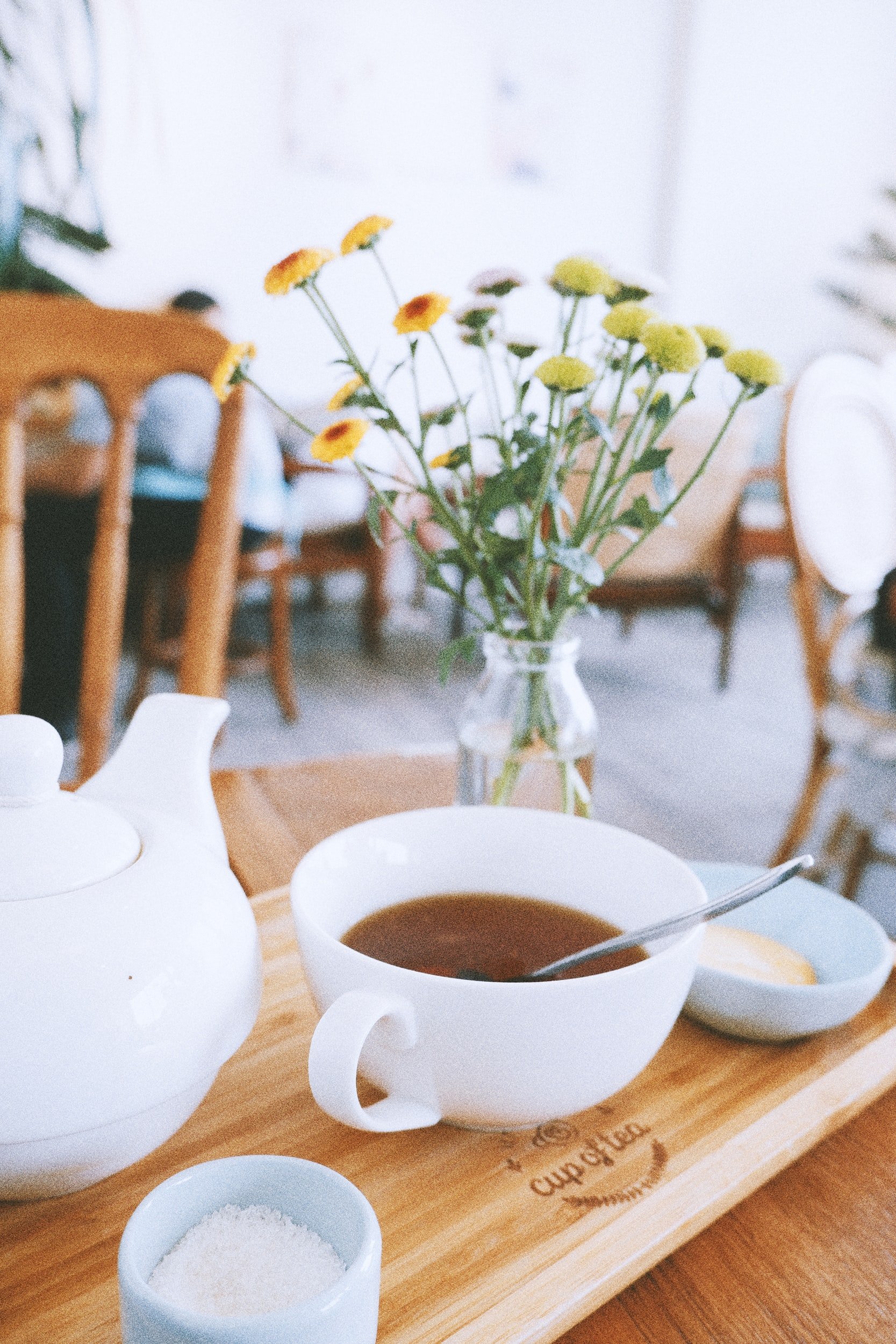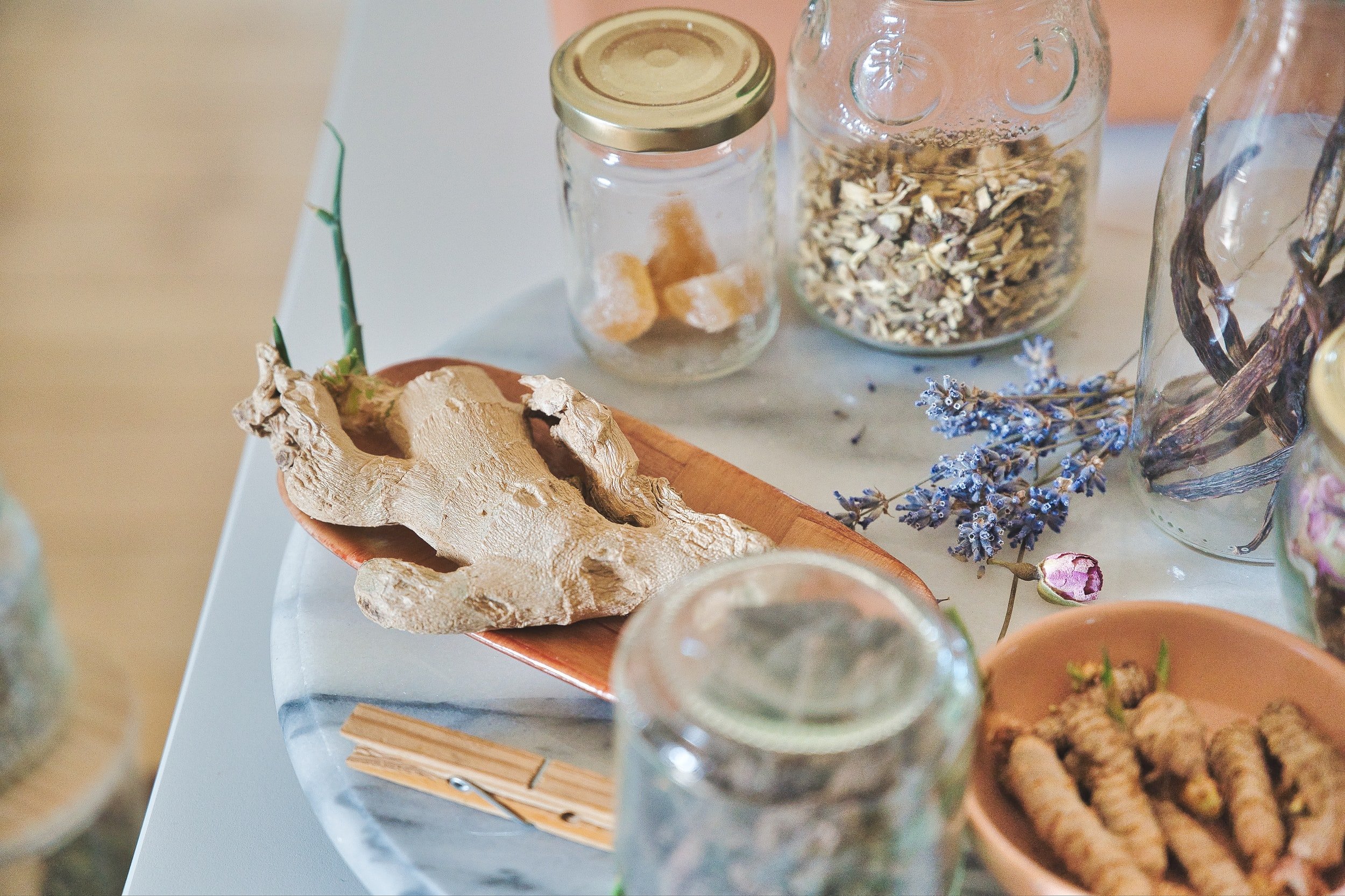Postpartum Herbal Tea
I can’t remember a time when I did not regularly drink some kinds of tea. Growing up, my Granny would make us steaming cups of black tea, so hot you couldn’t feel your tongue until lunchtime, with a teaspoon of sugar on cold winter mornings for good measure. We would drink sugary sweet sun tea by the gallons in the hot Oklahoma summers. If you were sick? Whewwww… you better hide it from her because she had a mean “Hot Toddy” recipe that would make you forget your name, age, AND address for a good long while. I never considered these teas “healing” but they most certainly were.
As I got older and traveled more, I was introduced to medicinal herbal teas, green teas, oolong, rooibos, CHAI! and the other immense options in the wonderful world of tea. I learned how tea has been a ritual for many, many lifetimes and how teas can heal and nourish you over time with dedication. I am now married at an Englishman and tea continues to be a very significant part of my daily ritual. Don’t get me started on if you should add milk or tea bag first…
As a Licensed Midwife, I often recommend herbs for improving overall vitality and health to my clients. Sometimes the herbs are very specific for desired results and taken for a short period of time. Sometimes, they are offered as an overall tonic or nourishment to a seemingly healthy pregnancy. My very favorite herbal tea recommendation during pregnancy is called NORA Tea. Its recipe originated with the lovely herbalist, Rosemary Gladstar, and she has gone on to share that nourishing blend with the world. I make large batches of organic NORA Tea regularly and give eager clients an 8oz portion to enjoy. NORA tea consists of Nettles, Oatstraw, Red Raspberry Leaf, and Alfalfa. Each of these powerhouse herbs works synergistically within the pregnancy to nourish and improve overall health. There are many variations of the NORA Tea recipe, but the original is my personal favorite.
Postpartum is a time after the birth of a baby where the mother, or birthing parent, is not only healing from the physical and mental aspect of birth, but is also generally doing so while attempting to keep up with the demands of said baby (and perhaps several other children as well). This can be a glorious and thankful time. A time for reflection on the pregnancy and the magic of bringing a new tiny human into this universe. It can also, for some, be overwhelming both physically and emotionally, causing additional anxiety and stress to a time where many new parents already feel unsure of the process of healing the parent and growing the baby with the least amount of harm possible. While an herbal tea can’t fix all the uncertainties of this time, it can offer a nourishing ritual of support cup by cup.
When recommending herbal postpartum teas, I think nourishing, supportive, redemptive, and loving. The plant allies that I have come to know and love for these traits are many. Cross-referencing them with the individuals health history, birthing history, and desired goals to create a custom blend for their overall needs can be tricky, but 100% worth it. Before I share my recipes with you, please note: DISCLAIMER I am not a Doctor.I am not a Clinical Herbalist. I am not YOUR care provider. As such, I recommend speaking with your PCP about the risks and benefits of these recipes prior to consuming them. These recipes are intended to share knowledge and further my own personal goals of teaching others about the plants that benefit us. They are not intended to heal or cure and illnesses or diseases.
Traditional herbal preparations are often measured in “parts” versus cups, ounces, etc. The following recipe uses “parts” for measurement. If you have a kitchen scale for measuring weights, that is ideal, if not, just get as close as you can. Remember, you can alter this to suit your needs and tastes. The herbs used are generally recognized as safe and should not affect the overall desired affect by changing it a little.
Postpartum Herbal Tea: recipe by Deanna Norris
When making a batch of tea, I generally like to make a large quantity of it and store it for ease. You can also make this by the cupful or by the pot if that suits your needs better. Good quality herbs should smell bright and not musty. Throw out herbs you are unsure about. Store away from direct sunlight.
1 part Lemon Balm
1 part Red Raspberry Leaf
2 parts Stinging Nettle
1/2 part Ginger Root
1/4 part Crampbark Root
1/2 part Dandelion Root
alt. 1/2 part Echinacea flower
alt. 1 part Chamomile flower
alt. 1/2 part Dried Rose petal
alt. 1/2 part Dried Lavender flowers
Method: Place the first 6 ingredients in a bowl and mix well. Boil water. Cool 1 minute. Add 1.5 tsp of herbal tea to a cup. Cover with cooled, boiled water. Steep for 7-10 minutes. Add honey or lemon as desired.
Alternative ingredients- you can add any of these options to give the tea a more floral taste versus an herbal taste.
Sun infusions are also a wonderful way to drink nourishing herbal remedies, especially when it is hot outside! In a gallon glass jar, place 1/2 cup of mixed herbal tea and cover with cold water. Sit outside in a sunny space for 6-8 hours, or until you feel called to bring it in. When ready, strain the plant matter off and pour tea into a glass with ice. Add sweetener of choice and enjoy!
Overnight infusions can be done similarly by placing 1/2 cup of mixed herbal tea in a gallon glass jar. Cover with cold water and place either on the counter or in the refrigerator overnight. Strain off the plant matter and pour the tea into a glass with ice. Add sweetener of choice and enjoy!
Note- Crampbark is wonderful for the first 1-2 weeks postpartum, and during the return of your monthly cycle to reduce painful cramps. I don’t recommend taking it for longer than 1-2 weeks. It is easily omitted from the recipe once you don’t need it anymore.


